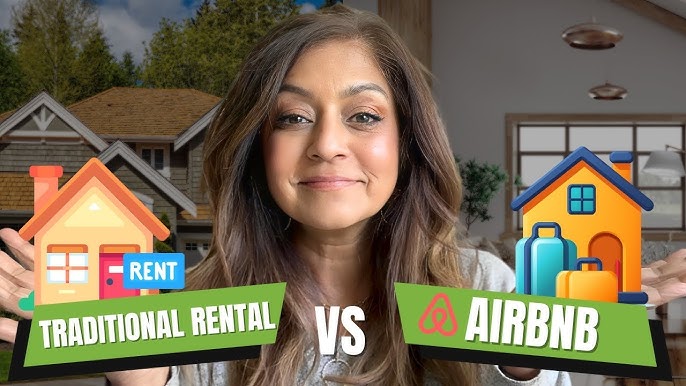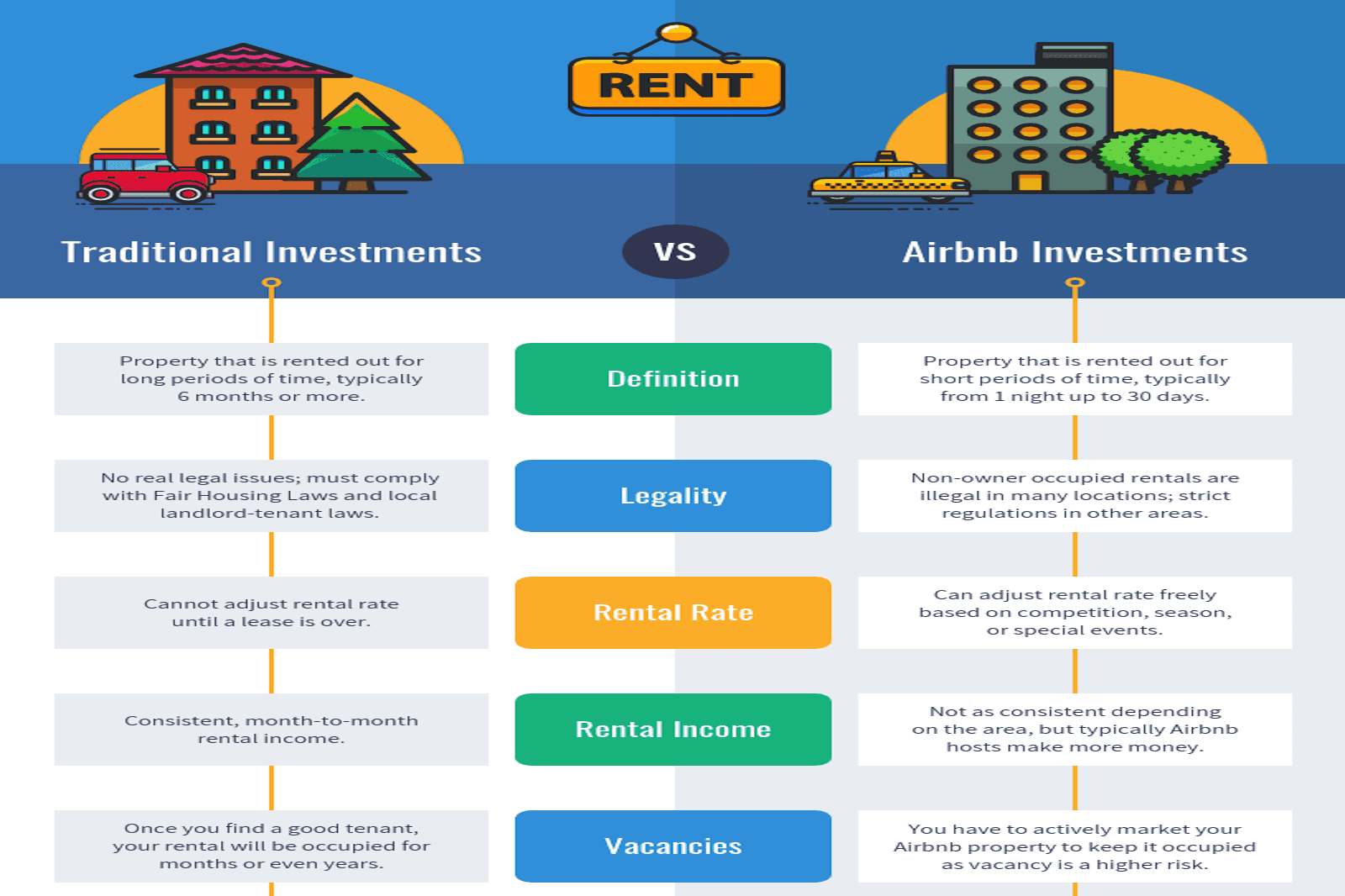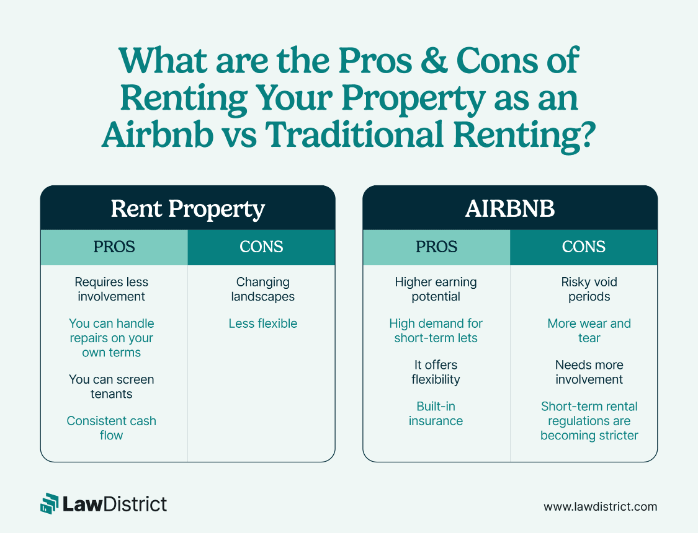Choosing between Airbnb and traditional renting is a decision that can impact your lifestyle and finances. You might be wondering which option is right for you.
Perhaps you’re looking to maximize your income or seeking the stability of long-term tenants. Each choice offers unique benefits and challenges that can shape your experience as a property owner or renter. Imagine the flexibility of hosting guests from around the world with Airbnb, turning your space into a bustling hub of cultural exchange.
On the other hand, traditional renting offers the comfort of consistent monthly income and the predictability of long-term agreements. Which path aligns with your goals and values? You’ll discover the key differences between Airbnb and traditional renting. We’ll explore how each option can affect your earnings, time investment, and overall satisfaction. Whether you’re a homeowner contemplating your next move or a renter weighing your options, understanding these insights will empower you to make a decision that feels right. Dive in and uncover the pros and cons that could transform your property into a thriving success story.
Market Demand
Market demand in the rental industry has evolved significantly. The rise of Airbnb has transformed how people view renting. Understanding these changes is crucial for property owners. Short-term and long-term rental markets have distinct dynamics. Both offer unique opportunities and challenges.
Short-term Rental Trends
Short-term rentals are increasingly popular. Airbnb has fueled this trend with its flexible offerings. Travelers seek unique experiences and locations. This demand drives short-term rental growth. Hosts can capitalize on peak travel seasons. They adjust prices based on local events. This flexibility can lead to higher income potential.
Short-term rentals attract diverse guest profiles. Business travelers, tourists, and digital nomads are common guests. Each group has different needs. Hosts must adapt to meet these demands. Short-term rentals require constant attention. Property management can be more labor-intensive. Hosts often face high turnover rates.
Long-term Rental Stability
Long-term rentals offer stability. Monthly leases provide consistent income. Property owners benefit from less frequent tenant changes. This reduces administrative burdens. Long-term tenants often stay for years. They provide financial predictability. Property management is usually less demanding.
Long-term rentals appeal to families and professionals. These tenants seek stability and community. They value location and amenities. Long-term rental properties often attract locals. Owners might face less seasonal fluctuations. This can lead to stable cash flow.
Both rental options have their pros and cons. Understanding market demand helps property owners choose wisely. Each choice caters to different audiences and needs. Analyzing trends can optimize rental strategies.
Revenue Potential
Choosing between Airbnb and traditional renting can impact your earnings. Each option offers unique revenue potential. Understanding the dynamics can help make the right choice.
Pricing Flexibility
Airbnb allows hosts to adjust prices based on demand. This flexibility can lead to higher earnings during peak seasons. Traditional renting usually involves fixed monthly rates. Predictable income is guaranteed but lacks the chance for price adjustments.
Occupancy Rates
Airbnb’s occupancy rates can vary greatly. High tourist seasons might see increased bookings. Low seasons may result in fewer guests. Traditional renting offers stable occupancy. Tenants often sign long-term leases. This ensures a steady monthly income.
Operational Costs
Operational costs are crucial in deciding between Airbnb and traditional renting. Both options have their unique challenges and expenses. Understanding these costs can help landlords make informed choices.
Maintenance And Repairs
Maintenance is a constant concern for property owners. Traditional rentals often require less frequent updates. Tenants typically stay longer, causing less wear and tear. For Airbnb hosts, frequent guest turnover can increase maintenance needs. Regular repairs ensure the property remains appealing to new guests.
Cleaning And Management Fees
Cleaning expenses differ significantly between Airbnb and traditional renting. Airbnb properties require cleaning after each guest stay. This leads to higher cleaning costs overall. Traditional rentals may only need seasonal or annual deep cleaning. Additionally, Airbnb hosts often hire property managers. They handle guest communication and bookings. Management fees can add to operational costs.

Credit: m.youtube.com
Legal And Regulatory Factors
Legal and regulatory factors significantly impact Airbnb and traditional renting. Airbnb hosts must navigate local laws and short-term rental regulations, while traditional landlords follow long-established tenancy rules. Understanding these differences is crucial for property owners and renters alike.
Navigating the legal and regulatory landscape is crucial when choosing between Airbnb and traditional renting. It can sometimes feel overwhelming, but understanding these factors can save you from unexpected headaches. Whether you’re a homeowner or renter, these rules can impact your decision significantly.Local Regulations
Local regulations can vary widely, affecting how you use your property. In some cities, short-term rentals like Airbnb are heavily regulated to prevent neighborhood disruption. You might find restrictions on the number of days you can rent out your home or even specific licensing requirements. Traditional renting often comes with fewer surprises. Long-term leases are usually more straightforward, with local laws governing tenant rights and landlord responsibilities. Have you checked your local zoning laws? They might hold the key to what’s allowed in your area.Tax Implications
Tax implications can be a game-changer. Short-term rental income might be subject to different tax rates compared to long-term rental income. You may need to pay occupancy taxes or submit extra paperwork. Traditional renting often involves standard income reporting, but don’t forget about property tax deductions. Managing taxes can be simpler with long-term leases. Have you considered how tax changes could affect your bottom line? Understanding these factors helps you make a smart decision. Legal and regulatory elements aren’t just red tape—they are your roadmap to responsible property management.Risk And Security
Airbnb offers flexibility but raises concerns about guest security and property damage. Traditional renting provides stable income, yet landlords face tenant disputes and legal risks. Balancing these factors is crucial for property owners seeking safe and profitable rental strategies.
When deciding between Airbnb and traditional renting, risk and security are crucial factors to consider. Each option presents its own set of challenges. Understanding these can help you make a more informed choice.Guest Screening Processes
Airbnb offers a streamlined guest screening process. Hosts can review potential guests’ profiles and read reviews from previous stays. This feedback loop provides a layer of security, but is it enough to ensure peace of mind? Traditional renting, on the other hand, often involves more rigorous screening. Landlords typically conduct credit checks, verify employment, and contact references. This thorough approach aims to select reliable tenants who will care for your property over the long term. You might prefer Airbnb’s flexibility with guests. Yet, remember that a guest staying for a few days might not have the same commitment to your property as a long-term tenant.Tenant Reliability
With Airbnb, guest turnover is high. This can be both a blessing and a curse. You may have frequent visitors, but each new guest brings an element of unpredictability. Traditional tenants usually sign leases for six months to a year. This provides stability and reduces the constant need to find new occupants. But, what if your tenant decides to break the lease or misses rent payments? Consider your tolerance for risk and how much time you’re willing to dedicate to managing your property. If you value consistent income, a traditional tenant might be more appealing. However, if you’re open to the dynamic lifestyle Airbnb offers, the potential for higher returns could outweigh the risks. Ultimately, it’s about finding the balance that suits your needs and comfort level. How do you weigh the potential risks against the rewards? Your decision could shape your property investment journey.
Credit: www.mashvisor.com
Time And Effort
Deciding between Airbnb and traditional renting involves considering time and effort. Each option demands different levels of involvement. Understanding these can help make an informed choice.
Host Responsibilities
Airbnb hosts manage frequent guest turnovers. This includes cleaning and restocking supplies. Hosts respond to guest inquiries promptly. Communication is key for maintaining good reviews. Regular updates to the listing keep it attractive. Hosts often handle maintenance issues quickly. They ensure the property remains guest-ready at all times. This can be time-consuming for some.
Landlord Duties
Traditional landlords have different responsibilities. They manage long-term tenant relationships. This often means dealing with leases and renewals. Landlords handle maintenance requests when needed. They might not need to respond as frequently as Airbnb hosts. Regular property inspections ensure tenant satisfaction. Landlords may hire property managers for assistance. This can reduce personal involvement.
Location Influence
Location plays a crucial role in choosing between Airbnb and traditional renting. It affects demand, pricing, and tenant turnover. Let’s explore how location influences both options.
Tourist Destinations
In tourist hotspots, Airbnb often attracts more guests. These areas see high foot traffic. Travelers seek convenient, short-term accommodations. Airbnb hosts can charge premium rates here. Tourists enjoy amenities and flexibility. Property owners benefit from higher earnings.
Traditional renting might struggle in these spots. Long-term tenants prefer quieter neighborhoods. They seek stability and community. Tourist areas are bustling, often noisy. This can deter potential long-term renters. Property owners may face longer vacancy periods.
Residential Areas
Residential areas favor traditional renting. Families and professionals opt for long-term stability. These neighborhoods offer schools, parks, and local services. They appeal to renters seeking permanence. Property owners enjoy steady income streams.
Airbnb sees less demand in residential zones. Short-term guests prefer central locations. Lower tourist traffic means fewer bookings. Hosts may need to lower prices. This affects potential income from short-term rentals.
Technology And Tools
Choosing between Airbnb and traditional renting depends on your needs. Airbnb offers flexibility and short-term stays. Traditional renting provides stability and long-term commitments. Both have unique benefits. It’s about what suits your lifestyle.
When deciding between Airbnb and traditional renting, the technology and tools available can significantly impact your choice. Technology has transformed how we manage and market properties, making the process more streamlined and efficient. Whether you’re renting your space on Airbnb or through traditional means, understanding the right tech tools can make or break your success.Platforms And Apps
Airbnb offers a robust platform that simplifies listing your property. It connects you to a global audience with just a few clicks. The app provides a user-friendly interface for managing bookings, communicating with guests, and updating your availability calendar. On the other hand, traditional renting often requires multiple platforms. Websites like Zillow or Craigslist can help list your property, but you might need separate apps for tenant screening and communication. Does juggling multiple apps feel overwhelming? Consider what level of tech integration suits your lifestyle. Airbnb’s all-in-one solution might appeal if you value simplicity.Property Management Software
Property management software is crucial for both Airbnb hosts and traditional landlords. For Airbnb, tools like Guesty or Hostfully can automate guest communication, manage cleaning schedules, and sync calendars across multiple listing sites. This automation saves time and reduces stress. Traditional landlords might use software like Buildium or Rentec Direct. These tools can assist in collecting rent, managing maintenance requests, and keeping track of tenant information. Think about your needs: Do you prefer hands-on management or automated solutions? The right software can enhance your efficiency and satisfaction. In my experience as a landlord, using property management software transformed my rental business. It minimized human error and maximized tenant satisfaction. What tech tools will you choose to enhance your rental experience? Your decision could be the key to successful property management.
Credit: www.lawdistrict.com
Frequently Asked Questions
What Are The Benefits Of Airbnb Over Traditional Renting?
Airbnb offers flexible rental terms and potential higher income. Great for short-term stays. Manage listings easily online.
How Does Airbnb Pricing Compare To Traditional Renting?
Airbnb pricing is dynamic. Rates vary by demand and season. Traditional renting usually has fixed monthly rates.
Is Airbnb Hosting More Work Than Traditional Renting?
Airbnb hosting can require more effort. Frequent guest turnovers. Regular cleaning needed. Traditional renting is more stable.
Can I Switch From Airbnb To Traditional Renting Easily?
Switching is possible. Requires adjusting contracts and marketing strategies. Consider local laws. Check tenant rights.
What Are Common Concerns With Airbnb Hosting?
Concerns include property damage, guest complaints, and local regulations. Insurance can help. Communication is key.
Conclusion
Choosing between Airbnb and traditional renting depends on your needs. Airbnb offers flexibility. Perfect for short stays or travel. Traditional renting provides stability. Ideal for long-term commitments. Consider your lifestyle. Budget matters too. Both options have pros and cons. Evaluate them carefully.
Airbnb might suit those who love change. Traditional renting fits those seeking routine. Understand your priorities. Make an informed decision. Weigh your options. Think about what you value most. Happy renting or hosting!





